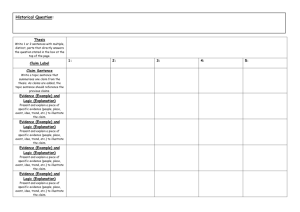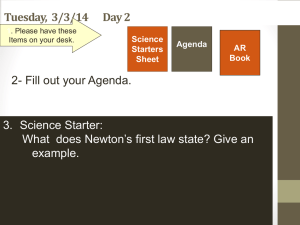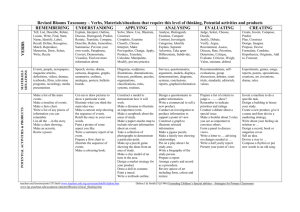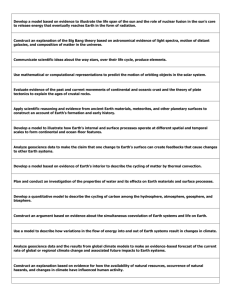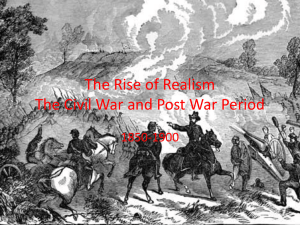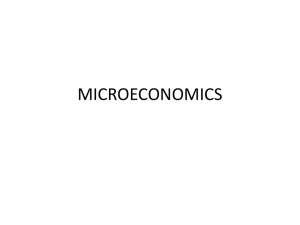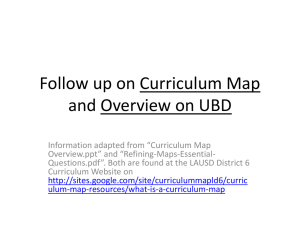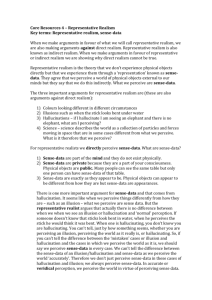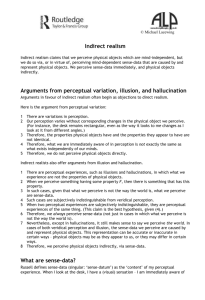Epistemology questions - The Richmond Philosophy Pages
advertisement
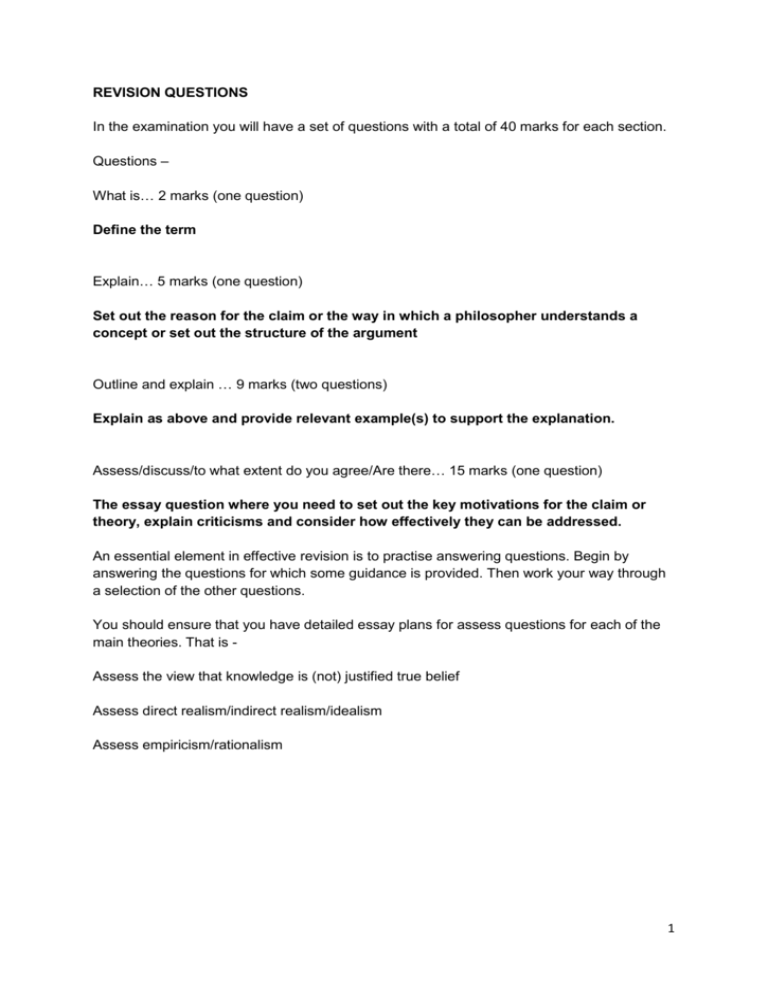
REVISION QUESTIONS In the examination you will have a set of questions with a total of 40 marks for each section. Questions – What is… 2 marks (one question) Define the term Explain… 5 marks (one question) Set out the reason for the claim or the way in which a philosopher understands a concept or set out the structure of the argument Outline and explain … 9 marks (two questions) Explain as above and provide relevant example(s) to support the explanation. Assess/discuss/to what extent do you agree/Are there… 15 marks (one question) The essay question where you need to set out the key motivations for the claim or theory, explain criticisms and consider how effectively they can be addressed. An essential element in effective revision is to practise answering questions. Begin by answering the questions for which some guidance is provided. Then work your way through a selection of the other questions. You should ensure that you have detailed essay plans for assess questions for each of the main theories. That is Assess the view that knowledge is (not) justified true belief Assess direct realism/indirect realism/idealism Assess empiricism/rationalism 1 The definition of knowledge What is the tripartite account of knowledge? Define using key terms – proposition, belief, truth, justification, necessary, sufficient, condition. Explain how propositional knowledge differs from acquaintance knowledge and ability knowledge. Outline and explain the tripartite view of knowledge. This was one of the mock questions. Have a go at producing a 9/9 answer. Outline and explain two challenges to the tripartite account of knowledge. Answer this by explaining the Gettier challenge (JTB not sufficient for knowledge) and one other criticism. For example, the view that belief is not a necessary condition for knowledge (Radford) or the claim that knowledge is a primitive or unalysable concept (Williamson). Explain what is meant by infallibilism/a no false-lemmas condition/reliabilism. Explain what is meant by epistemic virtue/virtue epistemology. Each of the above is a way of strengthening or replacing (reliabilism/virtue epistemology) the traditional justification condition. Make use of your notes and the Lacewing handouts. Explain and outline how a reliabilist approach can overcome Gettier type problems. Explain and outline a key challenge to reliabilism. ‘Knowledge is justified true belief.’ Discuss. ‘There is no satisfactory analysis of knowledge.’ To what extent do you agree with this claim? Past examination questions (from the old old specification)… 2007 Briefly explain what is meant by reliabilism. Explain and illustrate the view that justified true belief is not knowledge. 2 2006 Briefly explain why knowledge requires justification. 2005 Explain and illustrate how knowledge differs from true belief. 2002 Assess the view that justified true belief is not the same as knowledge. Specimen Paper (2000) Outline and illustrate the role of justification in distinguishing between knowledge and true belief. Assess the view that knowledge is justified true belief. (24 marks) 3 Perception What is direct realism/indirect/ realism/idealism? Define each of the theories in terms of what it says about: (i) (ii) (iii) (iv) the immediate objects of perception (physical objects or sense-data). Whether perception is immediate or mediated by sense data. Whether objects exist mind-independently and are the causes of our veridical perceptual experiences. Whether objects retain at least some of their properties when unperceived. Explain and outline two criticisms of direct realism. Using two of the following spell out precisely the criticism being made of direct realism: The argument from illusion. The argument from hallucination (what’s the difference between illusions and hallucinations?). The argument from perceptual variation (Russell’s table). The time-lag argument. Explain and outline two criticisms of indirect realism. Answer using the following: It leads to scepticism about the nature of the external world. It leads to scepticism about the existence of the external world. Explain why for Russell the existence of the external world is ‘the best hypothesis’. Explain the differences between primary and secondary properties. Explain what philosophers mean by sense-data. Explain two criticisms of the thesis that sense-data exist. Explain and outline the reasons for Berkeley’s view that reality consists of minds and their ideas. Contrast/identify one similarity and one difference between idealism and direct realism,. Contrast direct realism and representative realism. Explain and illustrate the distinction, made for example in representative realism, between the primary and secondary qualities of objects. Explain and illustrate how an idealist might distinguish between 'real' and 'hallucinatory' experience. Assess the case for direct realism/indirect realism/idealism 4 "An object retains all of its properties when unperceived." Discuss. Explore the claim that idealism solves the problems left by realist theories of perception. How convincing is the claim that only minds and their ideas exist? To what extent, if at all, should we agree with the "common sense" understanding of perceptual knowledge? Questions from the previous specification… Explain and illustrate one argument for distinguishing between primary and secondary qualities. [January 2009] Outline and illustrate the differences between sense data and physical objects. [May 2009]. Explain and illustrate two of the following arguments for the existence of sense-data: [January 2010] illusion perceptual variation the time-lag argument scientific descriptions of reality Describe the representative realist account of a perceiver’s relation to the external world [May 2010] Outline and illustrate three characteristics of sense-data. [January 2011] Outline and illustrate two ways of distinguishing primary from secondary qualities [May 2011] Explain and illustrate two criticisms of idealism. [January 2012] Explain and illustrate two differences between primary and secondary qualities. [May 2012] Explain and illustrate what is meant by the secondary qualities thesis. [January 2013] Explain and illustrate one strength and one weakeness of idealism. [May 2013] Consider whether the strengths of idealism outweigh the weaknesses. [January 2009] "The existence of the external world is a reasonable hypothesis." Consider what can be said both for and against this view. [May 2009]. Consider whether idealism provides a satisfactory account of the nature and existence of physical objects. [January 2010] "Grass is green." To what extent, if at all, is this claim philosophically naïve? [May 2010] Consider the claim that the weaknesses of representative realism outweigh its strengths. [January 2011] 5 "Sense data theories cause more problems than they solve." Assess whether this claim can be justified. [May 2011] Assess the claim that the immediate objects of perception are sense-data that represent the external world. [January 2012] "The strengths of idealism outweigh the weaknesses." Discuss. [May 2012] Assess the claim that we do not have direct knowledge of physical objects. [Jan 2013] Assess the claim that sense-data are unnecessary in explaining our perception of the world. [Jun 2014] . 6 The origin of concepts and the origins of knowledge. What is empiricism? What is rationalism? Define using the following terms – concept(s), knowledge, reason, experience, a priori, a posteriori, analytic, synthetic, necessary, contingent. Outline and explain the thesis that we have innate knowledge. Define what we mean by innate knowledge. Explain using arguments from Plato and Descartes or Leibniz. Explain what is meant by 'a priori' and explain one reason why the a priori is philosophically significant. Explain what is meant by both a priori and a posteriori knowledge. Explain what a synthetic a priori proposition is and the philosophical significance of the synthetic a priori. Explain what a synthetic a priori proposition is and illustrate with one example. Outline and explain the philosophical significance of Descartes’ Method of Doubt. Explain and illustrate how Descartes accounts for our knowledge of the self/the nature of mental and physical substance/God/the external world. Explain why Locke denies why there are innate ideas. Explain Leibniz’ response to the Lockean criticisms of innate ideas. Explain two criticisms of the Platonic thesis that the objects of knowledge are Forms. Outline and explain why Hume argues that all synthetic knowledge is a posteriori. Explain the Lockean account of concepts (general ideas). Explain the Humean account of concepts. Outline and explain two criticisms of empiricist explanations of our acquisition of concepts. 7 Assess Empiricism/Rationalism Assess the importance of a priori knowledge. "All ideas are copies of sense impressions". Discuss. "We cannot be blank slates. Some ideas or knowledge must be innate." Assess this claim. ‘All knowledge derives from experience.’ Discuss Questions from the previous specification… Explain and illustrate one account of the origin of our conceptual schemes. [January 2009] Explain and illustrate two ways in which it is possible to have a priori knowledge. [May 2009] Explain what is meant by the claim that the human mind starts as a tabula rasa and give one reason for holding this view. [January 2010] Illustrating your answer, explain the difference between contingent and necessary truths. [May 2010] Explain and illustrate why there is a problem concerning the conclusions reached through inductive arguments. [January 2011] Illustrating your answer, explain the difference between analytic and synthetic propositions. [May 2011] Outline and illustrate the view that certainty is confined to introspection and the tautological. [January 2012] Explain and illustrate what is meant by the claim that experience is intelligible only because we possess a predetermined conceptual scheme. [May 2012] Illustrating your answer, explain the difference between a priori and a posteriori knowledge. [January 2013] Illustrating your answer, explain the difference between inductive and deductive arguments. [May 2013] How convincing is the claim that we are born with at least some (innate) knowledge? [January 2009] Critically discuss the view that all knowledge comes from, and is justified by, sense experience. [May 2009] (Actual student answer) How convincing is the view that sense experience is the source of all knowledge? [January 2010] 8 "Without a predetermined conceptual scheme our sense experiences would be unintelligible." Assess the implications of this for empiricism. [May 2010] "At birth the mind is a tabula rasa". Discuss. [January 2011] Assess the claim that all knowledge and ideas derive from sensory experience. [May 2011] Assess the view that we have no innate knowledge. [January 2012] Assess the view that no significant claims about what exists are known a priori. [May 2012] How convincing is the claim that at birth the mind is a tabula rasa? [January 2013] 'The mind contains an innate grasp of the way the world is.' Discuss. [May 2013] Explain and illustrate to reasons for holding the view that the mind at birth is a tabula rasa (blank slate). [May 2014] ‘All the concepts that we have are derived from sense experience.’ Discuss. [May 2014] 9
